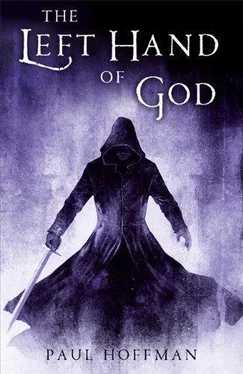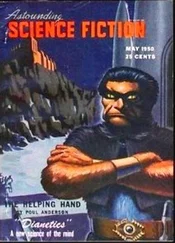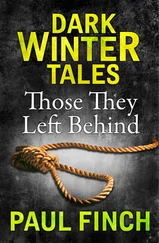“You do not look well, Redeemer,” cooed the voice. “Would you care for water?”
“No. Thank you.”
The voice of Kitty the Hare sighed as if deeply worried. It was, to Stape Roy, like being kissed by something unimaginably foul.
“To business, then.”
It took all of the Redeemer’s strength of purpose to answer, a strength of purpose proved many times in the burning of apostates and the general slaughter of the innocent.
To breathe deeply did no good. There was only more of that horrible smell of sweetness.
“It is true,” said Kitty the Hare, “that the four young persons you are looking for are being kept in Memphis.”
“Can you reach them?”
“Oh, Redeemer, anyone can be reached. You want them brought out alive?”
“Can you do that?” Poor Stape Roy could barely stop himself from fainting.
“I do not choose to, Redeemer. It does not suit, you see.”
Then he made a sound that might have been a gentle laugh, or might not. The door opened and the old man who had ushered Stape Roy in said, “If you come this way, Redeemer, I will finish our business.”
Ten minutes later and still green around the gills, Redeemer Stape Roy was recovering from his horrible interview with Kitty the Hare.
“Are you feeling better, Redeemer?” asked the old man. Stape Roy looked at him.
“What kind-”
“Do not ask questions that might be considered offensive,” interrupted the old man. “To be insulting about that kind of thing in this place is unwise.” The old man took a deep breath. “This is the score. You wish us to remove these four persons from the old city. This is possible, but it will not be done, because it will interfere with interests very close to our hearts.”
“Then I will leave and inform my master. He insists on hearing bad news immediately.”
“Don’t be unreasonable, Redeemer,” said the old man. “More haste, less speed. We will keep an eye on them. At some time they must leave the city. We will let you know. Then as a gesture of goodwill we will return them to you unharmed. This is a promise.”
“How long?”
“As long as it takes, Redeemer. We will do as we say-but let me be clear. If you make any attempt to take them yourselves, Kitty the Hare will consider this an attack upon his interests.”
There was a knock on the door.
“Come in.”
It opened and two guards entered. “These men will escort you to the gates of Kitty Town. Your horse has been fed and watered as a gesture of our good intent. Good-bye.”
As Redeemer Stape Roy emerged from the building, the air of Kitty Town hit him like a blow to the face. The noise! The people! He felt like a blind man whose first sight was of the rainbows of hell, a deaf man whose hearing is restored to the sound of the end of the world. There were bawlers with their loozles, mawleys with their ya-yas hanging out for all to see; there were benjamins in jemimas calling out, “Yellow, come and get get.” There were burtons and their naked pikers, middlemen calling for agony, aunts with their bung nippers covered in rouge and shouting for a half-and-half. There were Huguenots selling bum-baileys to the highest bidder and nutty lads with long tongues looking for a pigeon in a packet of two.
Struck by horror and stunned into immobility, Redeemer Stape Roy suddenly let loose a cry of utter loathing and disgust. Then, to the astonishment of the two guards escorting him, he took to his heels and ran his scorched soul to the gates of Kitty Town and out into the night.
Thirty miles from the last village protected by Memphis, IdrisPukke sat in a ditch and was rained on. There was nothing dry with which to light a fire, and even if there had been, it was too dangerous to do so. All he had eaten in the last twenty-four hours was half a potato, and one slimy with rot at that. How had a man who had commanded three armies, had the ear of kings and emperors, disgraced almost an entire generation of the beautiful daughters of the Nabob of this, the Satrap of that-how had he come here, to this? A good question, but one to which IdrisPukke knew the answer. The luck that most people might push once too often, IdrisPukke pushed on an almost daily basis. He had reaped where he had not sown, been given an inch and taken a mile; he had made six fortunes and lost seven. His nine lives were long ago exhausted. There was no denying his brilliance as a soldier in the field, his wit, his skill at arms and his political judgment admired everywhere in the known world-which is to say everywhere there was a death sentence against him, not including all those places where such matters as trials and sentences were considered tiresome formalities. In short there was no state to which IdrisPukke could flee where he was not liable to be boiled, disemboweled, burned or hanged, and often all four several times over. The greatest mercenary the world had ever seen was now reduced to hiding from one of dozens of bounty hunters and soldiers in a ditch, wet, tired and suffering terrible indigestion after his last moldy meal.
Twice in the previous month he had been captured and escaped almost immediately. But the real problem was that there was nowhere to escape to. All IdrisPukke had to do was close his eyes to hear the flapping wings of chickens coming home to roost.
SNAP!
Without thinking, IdrisPukke was on his knees and scrambling along the ditch as fast as he could go.
“Torches. Lights. He’s seen us!”
From all around the blaze of torches lit up the pitch black of the field. But what helped them helped IdrisPukke, and now he could see a cloud of trees thirty yards ahead. He scrambled on, fast as a dog, but slipping and sliding in the mud.
“There!”
He’d been seen. As he scrambled on, he could see the light of the torches moving together toward him. Anytime now-the arrow or sword and the agonizing death. Panting, afraid, he scrambled on. Still he was free and moving. He needed to break to the trees. He climbed up the bank, slipping and sliding, and just as he rose above its edge, a blow.
CRACK!
He stood for a moment. The world had stopped in a flash of lightning and pain. Then another blow and he was falling back. Before he hit the bottom of the ditch, fetching his head another terrible clout, he was already unconscious.
When he woke up, a huge, hairy gorilla had both his feet gripped firmly in one hand and was swinging his head casually into a brick wall like a housewife wearily beating a carpet. Then it stopped and the gorilla raised him up, face-to-face, and stared him in the eyes. He knew it was a gorilla because he had seen one at a circus in Arnhemland. This one was much bigger-its breath was hot and wet and smelled of month-old rotting meat, and huge streams of green snot were pouring out of its nose.
“Still alive, then,” said the gorilla. It was only then, and with some relief, that IdrisPukke realized he was still unconscious and dreaming. Then the gorilla continued lazily to bang his head against the brick wall.
When he forced his eyes open, the scene around him dissolved and became a farmer’s cart where he was bound, hand and foot, with his head banging against the wooden sidewall with every jolt as the cart moved over rutted land.
He breathed in deeply to stay conscious and moved his head away into the center of the cart. It was true, he thought: it is nice when you stop banging your head against a wall. Then the pain shrieked back and he stopped being grateful. He groaned.
“You’re awake, then, are you?”
It was a soldier and not a bounty hunter, which at least suggested that he had fallen into the hands of people who might want to go through some formalities before inflicting any unpleasantness. That meant a chance of escape. The soldier gave him a swift jab in the stomach with the butt of his short spear. “I asked you a civil question and I want a civil answer.”
Читать дальше











